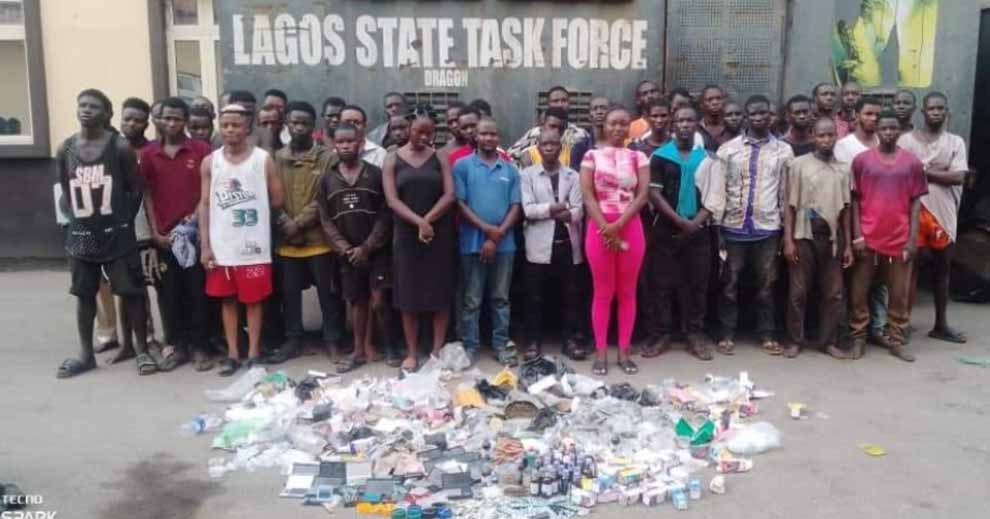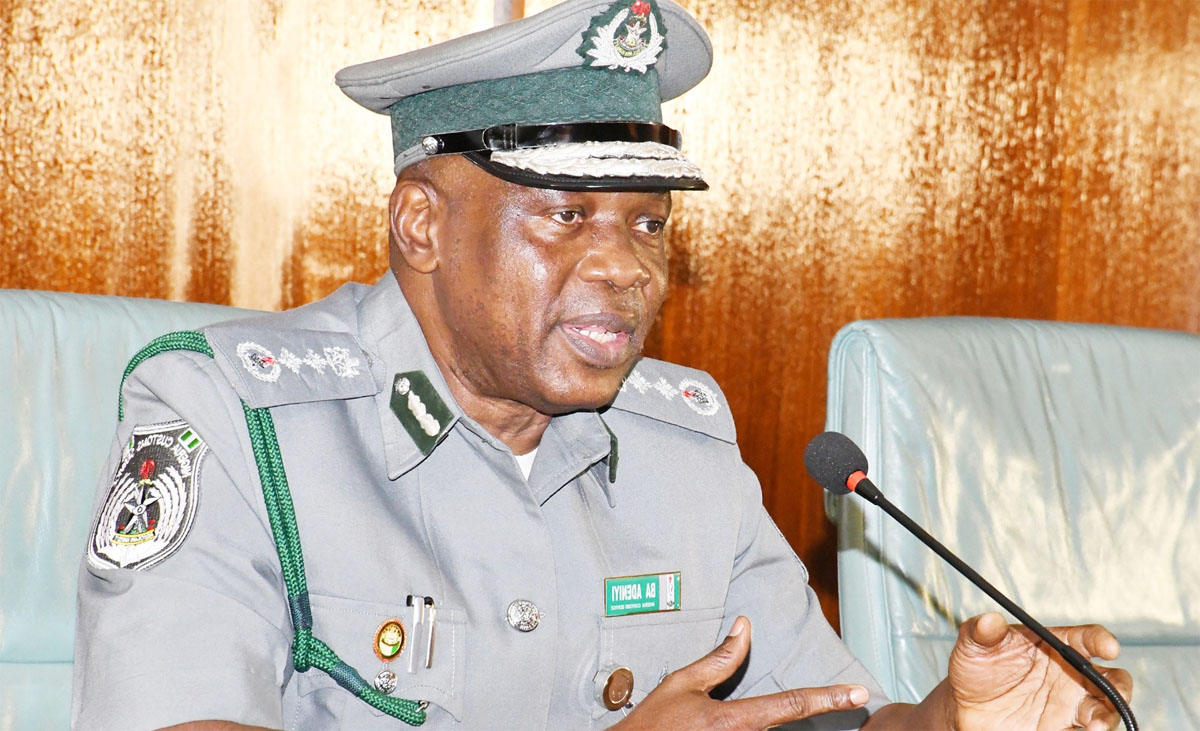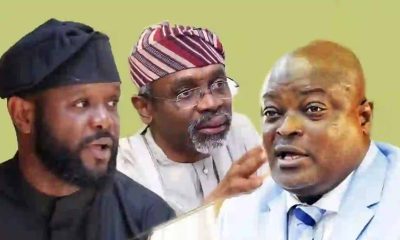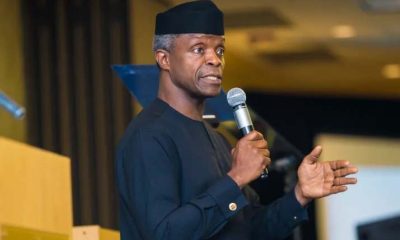metro
Osinbajo To Military: Account For Security Expenditure

Vice President Yemi Osinbajo has underscored the need for transparency in the management of resources meant for the acquisition of hardware for the defence and security agencies.
He spoke late Wednesday during a virtual interaction after receiving a presentation on “Defence Transformation and National Security: Strategic Options for Nigeria of the Future”, by the National Defence College Course 30 participants.
Daily Trust reports that Nigeria is facing a myriad of Foundation opens entry for Oxford scholarships challenges like terrorism, banditry, kidnapping for ransom and agitations for secession, among others.
Security breaches are ripe across all the six geopolitical zones including the Federal Capital Territory (FCT) as symbol of authority is being desecrated and civilians and security operatives killed.
While the federal government had been budgeting billions of naira on defence and security, experts believed the manner in which the resources are being spent is questionable; hence the call for transparency and in some cases probe.
In his presentation to the participants of the Defence College, the vice president said, “There needs to be more accountability because every time you hear about ‘we not having enough equipment,’ but there must be accountability.
“I will like to see a framework for greater accountability within the Ministry of Defence that ensures that they are able to account for military expenditure,” he said in a statement issued Thursday by his spokesman, Laolu Akande.
He said Nigeria’s current security challenges and emerging threats required the military and other relevant stakeholders to be several steps ahead of perpetrators while also stepping up local production of armaments.
READ ALSO:
- Soldiers beat police inspector to death in Lagos over traffic issue
- Arsenal, Crystal Palace clash tonight in 2022/23 EPL opener
- Adamu: APC’s All Muslim Ticket Positive Development
According to him, “If you look at the challenges that we are facing and the nature of those challenges, it is evident that we need to be many steps ahead of non-state actors in particular who are perpetrators of this asymmetric warfare that we are experiencing.”
Prof. Osinbajo, while commending the course participants for their efforts in proposing innovations in the defence sector, stressed the urgency of the local production of arms.
“If we say the local companies should produce some of the mobile platforms like Armoured Personnel Carriers (APCs) and Multi-Role Armoured Vehicle (MRAV), if we give them the contracts, they will produce, but if we choose to import rather than produce locally then we will never develop our military-industrial complex.”
Earlier in a presentation on behalf of the Course 30 participants, Col. A. A. Adamu proposed, among other things, the restructuring of the Ministry of Defence to reflect contemporary challenges as well as contain emerging threats to defence and security.
Other officials present at the event included the Chief of Staff to the President, Prof. Ibrahim Gambari; Chief of Naval Staff, Vice Admiral Awwal Gambo; the Commandant of the National Defence College, Rear Adm. Murtala Bashir, and representative of the Inspector General of Police, among other senior officers from the college.
Research report presentation by course participants to the vice president is a prominent feature in the annual academic calendar of the National Defence College.
Every year since 2016, participants of the college have presented reports of research conducted in key areas to the vice president.
Daily Trust reports that the specifics on the budget and other allocations to the defence sector are rarely made public amid outcry by troops for more equipment to confront the enemy.
There have been controversies about some releases to the security establishments.
For instance, on December 14, 2017, Nigerian governors approved the release of $1bn from the country’s excess oil account to the federal government to buy arms for the effective execution of the Boko Haram war.
The approval reportedly reduced the $2.3bn Excess Crude Account by half, a development that generated heated debate with some analysts saying the money would be stolen.
At the time of the release, Edo State Governor, Godwin Obaseki, who briefed the press on the decision after the meeting of the National Economic Council (NEC), said the money would cover the whole array of needs, which included the purchase of equipment, training for military personnel and logistics.
However, in 2019, the National Security Adviser (NSA), Maj. Gen. Babagana Monguno (retd), said a huge amount of money approved for arms purchase under the ex-service chiefs could not be accounted for.
For instance, Gen Monguno cried out that he did not know the whereabouts of the $1bn approved by the governors.
The NSA office later issued a statement saying Monguno did not say money was missing.
The Presidency also reacted saying the funds allocated for procurement of weapons during the time of the former service chiefs were not missing, adding that procurements had been made but the arms were yet to be delivered.
The service chiefs were Gen Abayomi Olonisakin (Chief of Defence Staff-CDS); Tukur Buratai (Chief of Army Staff-COAS)); Ibok-Ete Ekwe Ibas (Chief of Naval Staff-CNS); Sadique Abubakar (Chief of Air Staff-CAS).
READ ALSO:
- Nigeria Secures $1.5bn Loan From US to Boost Solar Power Infrastructure
- Multi-billion naira NADDC land, imported equipment rot away, says ex-agency boss
- Why Abuja-Kaduna train victims still in captivity, by ex-negotiator
The Senior Special Assistant to the President on Media and Publicity, Garba Shehu, said there was no way funds could disappear under the leadership of President Muhammadu Buhari.
He also said the NSA was misquoted, stressing that Monguno did not accuse the ex-service chiefs of misappropriation of funds.
Shehu said, “About the $1bn taken from the Excess Crude Account with the consent of state governors used for military procurements, I want to assure you that nothing of that money is missing.
“The reference by it in the interview of the BBC Hausa Service by the National Security Adviser has been misconstrued and mistranslated. NSA made two critical points -one is that we don’t have enough weapons, which is a statement of facts, and two procurements made have not been fully delivered.
“At no point did the NSA say that money has been misappropriated and that no arms seen. They have not been delivered, that is correct; these are things you don’t get off the shelves,” Shehu said.
Non-transparent military spending can create war economy – Expert
Speaking on the implication of the vice president’s demand, a financial crimes expert, Umar Yakubu, explained that non-transparency in military spending could cause a war economy.
“There is a need for more transparency in military spending because if we don’t, we are going to create a war economy where we will not be able to continue sustaining the corruption and where the war will not finish. That is one of the reasons insecurity has not gone down,” Yakubu said.
He stressed that Nigerians would have more confidence in the military and the work they do if they halt the current secrecy regarding their spending.
“If you look all over the world, one area where there seems to be lack of transparency and opaqueness is the military sector in relation to their expenditure.
“Most governments hide under the cover of insecurity to tell you that they are not going to disclose how much they are spending on insecurity.
He said for the vice president to call for more transparency, speaks volumes.
“If you look at the trajectory from 2017 to 2021, the military budget has been increasing by a minimum of N500 million every year. If I am correct, it is over N2trn now – just to the military.
“If you crosscheck with what the minister of finance said, their releases are high, it is not just only about their budget. The releases are high, maybe up to 90%.
“Now, if there is so much heavy military expenditure and when you ask them, they will tell you that they lack equipment, so what is the problem? Where does the problem lie?” he asked.
Efforts to reach the Director, Defence Information, Maj.-Gen. Jimmy Akpor proved abortive as calls to his mobile phone did not connect before filing this report.
metro
Man gets four-year jail for sexually assaulting teenager in Lagos

Man gets four-year jail for sexually assaulting teenager in Lagos
One Onyeka Ubaka has been sentenced to four years imprisonment for sexual assault and maltreatment of a 16-year-old girl in Lagos State.
He was convicted and sentenced by an Ikeja Sexual Offences and Domestic Violence Court on Tuesday.
Justice Rahmon Oshodi convicted him after he pleaded guilty to the two amended charges brought against him by the Lagos State Government.
Ubaka was initially arraigned on January 12, 2024, and was initially charged with defilement through one-count information filed on October 26, 2023, to which he pleaded not guilty.
In the court proceedings, the prosecution counsel, B. E. Okeowo, presented a single witness, the prosecutrix, whose testimony proved particularly significant in establishing the case against the defendant. The prosecutrix who provided a testimony, identified the defendant as her boyfriend and disclosed that she was 16 years old in 2023 and that her relationship with the defendant began in her mother’s shop.
The victim testified to the court that the defendant had multiple instances of sexual intercourse with her, which resulted in pregnancy and childbirth.
“The defendant is the father of my child. He impregnated me, and the child is five months old.”
According to PUNCH, the victim, during cross-examination, gave testimony evidence that incriminate the defendant.
READ ALSO:
- Lagos taskforce raids criminal hideout, arrests 53 drug peddlers
- Nigeria’s foreign reserves records marginal increase, now $40.88bn – Cardoso
- Naira rises to N1,755/$ in parallel market
In one instance, she disclosed that the defendant took her to a bar, gave her yogurt to drink, and after she drank it, she lost consciousness. She further disclosed that she woke up in a hotel room and realised that the defendant had non-consensual sex with her and told her to keep the incident a secret.
At the court proceeding on Tuesday, Justice Oshodi disclosed to the court that the prosecution counsel, B. E. Okeowo, had informed the court that the parties had entered a plea and sentence agreement dated and filed on November 25, 2024. The court then charged and convicted the defendant on the amended charge of indecent acts and sexual assault to which the defendant pleaded guilty.
Justice Ramon, in his judgment, stated that the prosecution had established beyond a reasonable doubt the charges brought against the defendant, and found the defendant guilty of indecent act and sexual assault.
“From the evidence presented by the prosecution, I am satisfied that the essential elements of indecent acts and sexual assault have been established. There is an abundance of evidence to support this conclusion. The defendant’s guilty plea further justifies his conviction for the offences contained in the amended information.
“Therefore, I find the defendant guilty and convict him under Sections 134 and 263 of the Criminal Law Supra”, he ruled.
When asked what he had to say, the defendant begged the court to temper justice with mercy.
“Temper justice with mercy so that I will take care of my responsibility,” he appealed.
It is gathered that the defendant’s father had paid the sum of N300,000 and had undertaken to sponsor the prosecutrix first degree and take full responsibility for the child until the child is eight years old.
The prosecution counsel in her final statement asked the court to convict the defendant according to the plea bargain.
“We ask that the convict be sentenced according to the plea bargain agreement starting from the day of remand, March 23, 2023, and this will pass a message to society that sexual offenders are not tolerated in our society.
“We also ask that the name of the convict be registered in the Sexual Offenders Register”, Okeowo said.
Justice Oshodi then found the defendant guilty and sentenced him to four years imprisonment.
Man gets four-year jail for sexually assaulting teenager in Lagos
metro
Lagos taskforce raids criminal hideout, arrests 53 drug peddlers

Lagos taskforce raids criminal hideout, arrests 53 drug peddlers
CSP Adetayo Akerele, Chairman of Lagos State Environmental and Special Offences Enforcement Unit, announced the arrest of 53 suspected criminals in Gowon Estate.
Akerele said this operation aimed to boost safety, security, and environmental decorum in the area.
“The agency apprehended drug peddlers, addicts; miscreants; street urchins; illegal street traders and people of shady business dealings.
“We found various illicit drugs and narcotics, including Indian hemp, codeine syrup, and colorado,” Akerele said.
The operation brings relief to residents of Gowon Estate, Ipaja, Egbeda, Idimu, and surrounding areas affected by these criminals.
“Residents have endured trauma and safety risks due to these unauthorized squatters.
READ ALSO:
- Nigeria’s foreign reserves records marginal increase, now $40.88bn – Cardoso
- Naira rises to N1,755/$ in parallel market
- Nigeria Customs returns 21 stolen luxury vehicles to Canada
The taskforce is committed to safeguarding residents and ridding the metropolis of individuals preying on law-abiding citizens,” Akerele said.
The agency will monitor other criminal hideouts, blackspots, and abandoned properties.
“This vigilance aims to deter individuals with sinister motives.
“These arrests demonstrate our determination to maintain a safe environment.
“We will hold every individual involved in these illegal practices accountable,” Akerele said.
The 53 suspects will face charges for narcotics-related offenses.
Residents are urged to report suspicious activities through the “See Something, Say Something” initiative.
Lagos taskforce raids criminal hideout, arrests 53 drug peddlers
metro
Nigeria Customs returns 21 stolen luxury vehicles to Canada

Nigeria Customs returns 21 stolen luxury vehicles to Canada
The Nigeria Customs Service (NCS) yesterday returned 21 luxury vehicles worth over N1.8 billion to Canada after they were stolen and smuggled into Nigeria by a criminal syndicate.
Speaking to Newsman in Lagos, Comptroller General of Customs, Mr. Adewale Adeniyi, emphasized the seriousness of the growing trade in stolen vehicles and its impact on Nigeria’s economy and security.
According to Adeniyi, Nigeria has become a significant hub for stolen vehicles in West Africa, with syndicates exploiting the country’s ports and borders to traffic vehicles from regions such as Europe, North America, and South America.
He highlighted data from the National Bureau of Statistics indicating that only 54% of stolen vehicles were recovered between 2013 and 2015, illustrating the scale of the problem.
“This trend undermines our legitimate automotive market, strains our security infrastructure, and damages Nigeria’s international reputation,” Adeniyi said.
READ ALSO:
- Pro-Wike Rivers lawmakers move to prevent probe of FCT minister tenure as governor
- Bianca raises hope Tinubu will free Nnamdi Kanu to restore peace in South-East
- Canada, Mexico, China respond to Trump tariff threats
He further noted that the illegal trade affects President Tinubu’s economic reforms, which aim to position Nigeria as a trusted hub for international commerce.
To combat this challenge, Adeniyi disclosed that the NCS launched Operation Hot Wheels, a collaborative initiative involving the Economic and Financial Crimes Commission (EFCC), Canadian authorities, and international law enforcement agencies. The operation focused on intelligence sharing, surveillance, and interdiction to disrupt vehicle trafficking networks.
Adeniyi further disclosed that the operation uncovered sophisticated smuggling techniques, including false cargo declarations and containerized shipments used to conceal stolen vehicles.
During one operation, officers intercepted a container at Onne Port in Rivers State declared to contain used vehicles and spare parts. A physical examination revealed three undeclared 2021 Toyota Highlanders, two of which were confirmed stolen from Canada.
-

 metro24 hours ago
metro24 hours agoBREAKING: Port Harcourt refinery begins operation
-

 Business3 days ago
Business3 days agoJust in: Dangote refinery reduces petrol price for marketers
-

 metro2 days ago
metro2 days ago40-foot container falls on car in Lagos
-

 Politics3 days ago
Politics3 days ago2027: Lagos Speaker, Obasa joins gov race, may battle Seyi Tinubu, others
-

 Politics2 days ago
Politics2 days agoLagos 2027: Seyi Tinubu campaign team releases his life documentary
-

 International2 days ago
International2 days agoTrump to sack 15,000 transgender officers from U.S. military: Report
-

 Education16 hours ago
Education16 hours agoUS University opens 2025 scholarships for international students
-

 Entertainment2 days ago
Entertainment2 days agoPolygamy best form of marriage for Africa – Okey Bakassi












